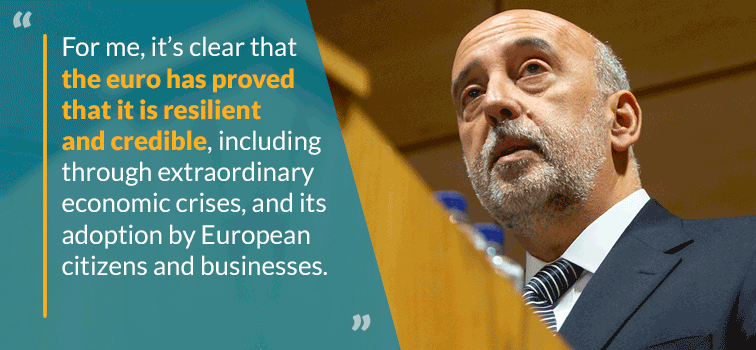ECB@25
01 June 2023
Blog

Today marks the 25th anniversary of one of the world’s youngest central banks. The European Central Bank came into existence on 1 June 1998 and its silver anniversary contrasts with the fact that it is the central bank of one of the world’s oldest communities and one of the world’s biggest economies. (Incidentally, the Central Bank of Ireland marks its 80th anniversary this year, the US Federal Reserve its 110th, and Sweden’s Riksbank its 355th.)
I remember the debates in the years preceding the ECB’s creation, and the subsequent introduction of the Euro itself (on 1 January 1999, when the ECB also began to exercise its full powers) and the design choices around the first notes and coins.
Today, 20 of the 27 EU Member States are members of the Eurosystem and have the Euro as their currency. All 20 central bank Governors, along with the six members of the Executive Board sit on the ECB’s Governing Council.(And all 27 meet
quarterly in the General Council.)
Those early debates were both technical and political. Could a single currency work in a heterogeneous macroeconomic area with separate fiscal policies? Wasn’t a currency an important statement of nationhood and would countries that
defended their sovereignty over fiscal and tax policy really give up their own currency? Would Germany be prepared to risk the Bundesbank’s credibility for a European project? And many, many more.
We know where the political debate ended. And we know that the technical debate has ended too. I know some will argue that it’s “too early to say” (the Zhou Enlai defence, when he was asked – in 1972 – about the
impact of the French revolution, although he was speaking about the events of 1968 rather than 1789!) but for me it’s clear that the Euro has proved that it is resilient and credible, including through extraordinary economic crises, and its
adoption by European citizens and businesses. As Christine Lagarde wrote last week,
“Ultimately, the euro is more than a currency. It is the strongest form of European integration and stands for a united Europe that works together, protecting and benefiting all its citizens. And the ECB will always be a cornerstone of that
effort.”
There are undoubtedly many positives to look back on over the past twenty-five years and there were of course challenges, such as the financial and sovereign debt crises of the early 2010s and the current high inflation. The learnings from these challenges
have helped to strengthen the resilience of an important institution at the heart of European integration. This included the approach taken by the ECB on banking supervision and, as a result, helped to rebuild resilience and trust in the European
banking sector.
A successful first twenty-five years is an excellent platform to build for the next twenty-five. But as we mark those twenty-five years, we should also identify the questions that we should consider as we look towards the golden anniversary.
Some of these questions are about the conduct of monetary policy in a world that is emerging from unique economic restrictions and that is contemplating changes to the global interconnectedness it has increasingly relied on for its prosperity alongside
the great economic transitions that are underway (climate change, our ageing society, the ongoing rapid impact of technology). One answer is that the ECB needs to remain agile to deliver effective monetary policy in an ever-evolving landscape.
But some of the questions are broader (as, after all, a currency is only part – albeit a very important part – of an economy’s overarching macroeconomic framework).
For example, what do the ‘great economic transitions’ mean for the EU’s current macro framework? There is clearly going to be a need for structural reform to manage these transitions but does the framework itself need to change?
Would economic policy work more effectively if a single monetary policy was complemented by a more coordinated fiscal policy or even a central fiscal capacity? Indeed, would the achievement of price stability be helped in these circumstances?
And would a move towards a greater central fiscal capacity be more or less effective at supporting better outcomes for the European economy and its citizens?
Can we make Capital Markets Union a reality? What does the pace of technological change mean for monetary policy and for the regulation and supervision of the financial system? What are the implications of the digital euro to the overall landscape?
Monetary policy doesn’t work in a vacuum. The overarching framework matters. On the evidence, the Eurosystem has been a success for its citizens and its economy and the ECB should be proud of its first 25 years, as should the creators
of the overarching framework itself.
But, as the world changes, the question we also need to consider is what changes need to be made to ensure the ECB and the Eurosystem continues to be a “cornerstone” of “a united Europe that works together, protecting and benefiting
all its citizens”. What do we need to do to ensure that Europe’s overarching macro framework is fit for an economic environment undergoing significant transitions? Could an evolved framework enhance the strength of the ECB’s
policymaking? In short, could the ECB have a stronger, better and more effective second 25 years?
Stewardship is a core part of leadership. After all, if we simply focus on maintaining the status quo of institutions or policy
frameworks in a rapidly changing world, we may in fact be weakening them. We need to make sure we learn the lessons of the past and not feel trapped by them. We need to make sure we understand the lessons of the present and not feel paralysed by
them. And we need to be prepared to challenge ourselves and make changes that will ensure a successful 50th anniversary.
Gabriel Makhlouf
Read more: